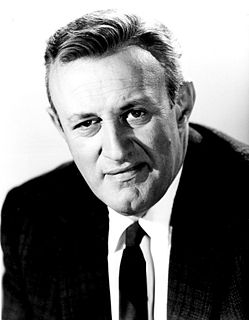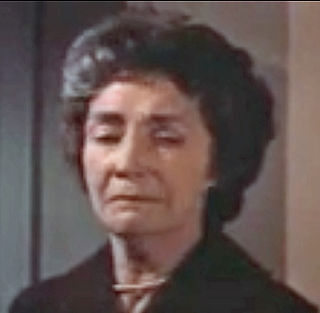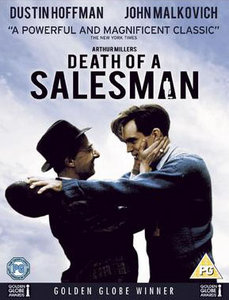| Death of a Salesman | |
|---|---|
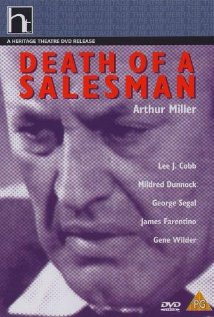 DVD cover | |
| Genre | Drama |
| Screenplay by | Arthur Miller |
| Story by | Arthur Miller (playwright) |
| Directed by | James B. Clark Alex Segal |
| Starring | Lee J. Cobb Mildred Dunnock James Farentino George Segal |
| Music by | Robert Drasnin |
| Country of origin | United States |
| Original language(s) | English |
| Production | |
| Producer(s) | Daniel Melnick David Susskind Marvin J. Chomsky (associate producer) |
| Running time | 100 minutes |
| Production company(s) | CBS |
| Distributor | CBS |
| Release | |
| Original network | CBS |
| Original release |
|
Death of a Salesman is a 1966 American made-for-television film adaptation of the play of the same name by Arthur Miller. It was directed by Alex Segal and adapted for television by Miller. It received numerous nominations for awards, and won several of them, including three Primetime Emmy Awards, a Directors Guild of America Award and a Peabody Award. It was nominated in a total of 11 Emmy categories at the 19th Primetime Emmy Awards in 1967. Lee J. Cobb reprised his role as Willy Loman and Mildred Dunnock reprised her role as Linda Loman from the original 1949 stage production.
A television film is a feature-length motion picture that is produced and originally distributed by or to, a television network, in contrast to theatrical films, which are made explicitly for initial showing in movie theaters.
A film adaptation is the transfer of a work or story, in whole or in part, to a feature film. Although often considered a type of derivative work, recent academic developments by scholars such as Robert Stam conceptualize film adaptation as a dialogic process.
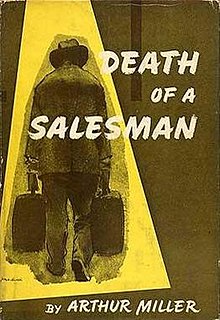
Death of a Salesman is a 1949 play written by American playwright Arthur Miller. It won the 1949 Pulitzer Prize for Drama and Tony Award for Best Play. The play premiered on Broadway in February 1949, running for 742 performances, and has been revived on Broadway four times, winning three Tony Awards for Best Revival. It is widely considered to be one of the greatest plays of the 20th century.
Contents
Playbill markets this version of the play as an "abbreviated" one. [1] Although the performance is abridged, it was adapted for television by Miller himself, meaning that not much substance was lost in the changes. [2] The production was filmed after several weeks of rehearsals. [3]

Playbill is a monthly U.S. magazine for theatregoers. Although there is a subscription issue available for home delivery, most copies of Playbill are printed for particular productions and distributed at the door as the show's program.
It was a 1966 CBS television adaptation, [4] which included Gene Wilder, James Farentino, Bernie Kopell and George Segal. Cobb was nominated for an Emmy Award for the performance. Mildred Dunnock, who had co-starred in both the original stage version and the 1951 film version, again repeated her role as Linda, Willy's devoted wife, and earned an Emmy nomination. In addition to being Emmy-nominated, Cobb and Dunnock were Grammy Award-nominated at the 9th Grammy Awards in 1967 in the category of Best Spoken Word, Documentary or Drama Recording. This movie is one of several adaptations of the play and was contemporaneous with a May 1966 BBC version starring Rod Steiger and produced by Alan Cooke. [5] [6]
CBS is an American English language commercial broadcast television and radio network that is a flagship property of CBS Corporation. The company is headquartered at the CBS Building in New York City with major production facilities and operations in New York City and Los Angeles.

Jerome Silberman, known professionally as Gene Wilder, was an American actor, screenwriter, director, producer, singer-songwriter and author.
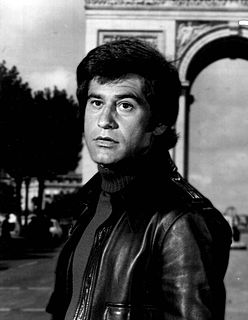
James Farentino was an American actor. He appeared in nearly 100 television, film, and stage roles, among them The Final Countdown, Jesus of Nazareth, and Dynasty.
The production marked the acclaimed reunion of the leading actor and actress from the original 1949 broadway cast. [1] [2] The performance also marks a strong dramatic turn for George Segal who is known for his comic work, while a young Gene Wilder presents a comic but sensitive performance as Bernard. [2]

George Segal is an American actor and musician. Segal became popular in the 1960s and 1970s for playing both dramatic and comedic roles. Some of his most acclaimed roles are in films such as Ship of Fools (1965), King Rat (1965), Who's Afraid of Virginia Woolf? (1966), The St. Valentine's Day Massacre (1967), Where's Poppa? (1970), The Hot Rock (1972), Blume in Love (1973), A Touch of Class (1973), California Split (1974), For the Boys (1991), and Flirting with Disaster (1996). He was one of the first American film actors to rise to leading man status with an unchanged Jewish surname—thus paving the way for Dustin Hoffman and Barbra Streisand.
